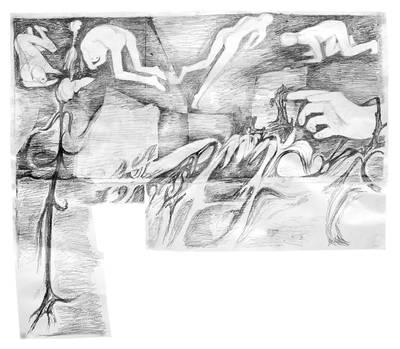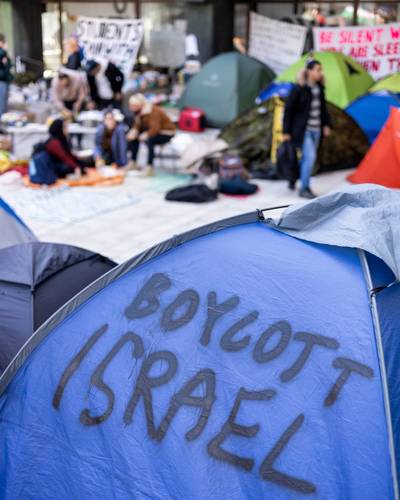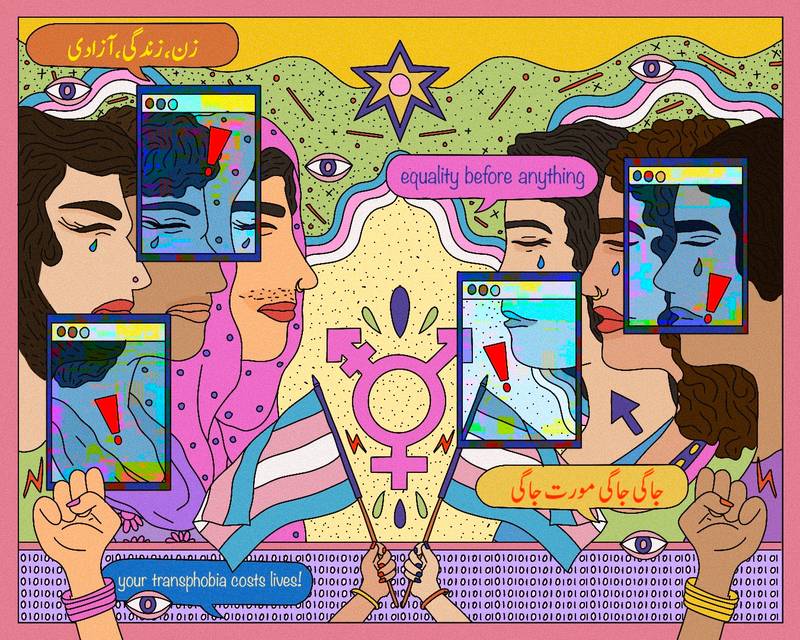

Illustration by Hafsa Ashfaque
Hira Azmat is a writer, editor, and Pushcart Prize-nominated poet. She has been working in the cultural industries in Pakistan for the last twelve years as a curator of cultural spaces and an international arts manager. She is interested in arts and culture, movements and subcultures, literature, and good design.
What do a fashion designer, a youth empowerment YouTuber, and a right-wing politician have in common? In Pakistan, the answer is hatred of transgender people, and their battleground of choice is the internet.
Historically, the South Asia region has been home to a visible, though marginalized, transgender/khawajasira community, and Pakistan has been one of the leading countries with the most progressive legislation on transgender rights. However, 2021 saw a surge in religious right-wing discourse against transgender rights in the country. Spearheaded by a lone senator of the right-wing religious Jamaat-e-Islami political party, Mushtaq Ahmed, the target of this anti-trans campaign was the Transgender Rights Act 2018, which gives citizens the “right to be recognized as per his or her self-perceived gender identity.” Critics saw it as a bid for relevance for his waning political party and career. However, he quickly attracted a motley crew of similarly inclined firebrands, including fashion designer Maria B, philanthropist Aliya Sarim Burney, and YouTube podcaster Raja Zia ul Haq of Youth Club fame. Their online hate campaigns immediately resulted in an uptick in threats faced by visible trans activists on social media.
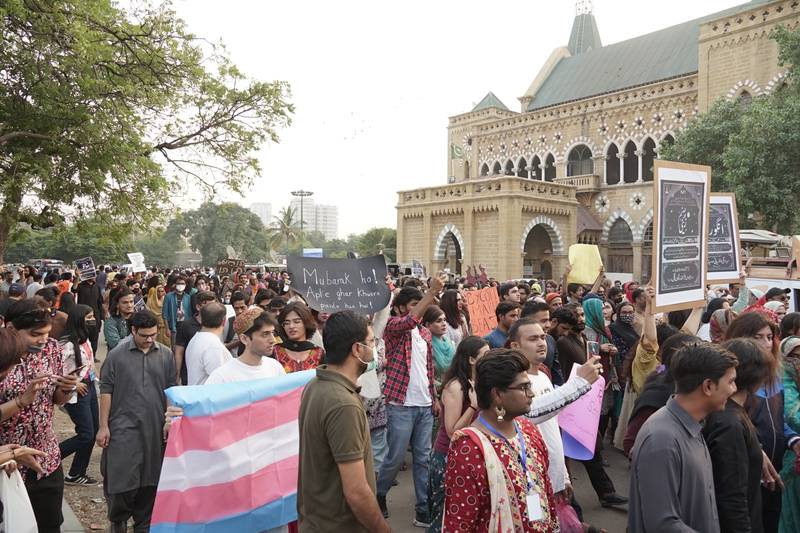

Members of the trans community and allies gathered outside Frere Hall, Karachi, for the ‘Sindh Moorat March’
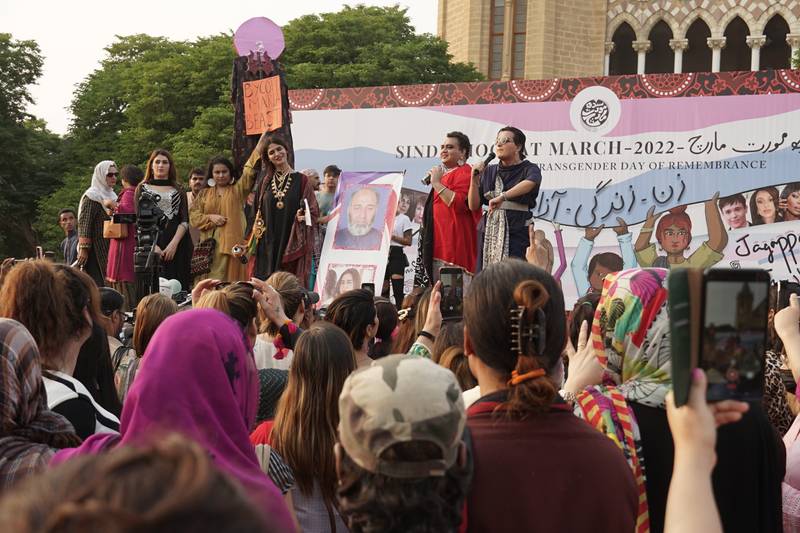

‘Sindh Moorat March’, protest sign reading “Boycott Maria Beast”
It would be an understatement to say that progressive voices in Pakistan, including human rights activists, community organizers, journalists, and politicians, operate largely in a climate of fear. Punjab Governor Salmaan Taseer’s shocking murder by his bodyguard in 2011 for allegedly anti-religious views brought this into stark relief. Such deliberately cultivated fear by right-wing elements within Pakistani society, who routinely use religiously coded language in smear campaigns to undermine, discredit, and, most crucially, threaten progressive voices in the country. These progressive activists include those advocating for the rights of different religious minority communities, women, and gender minorities.
The first tier of this atmosphere of fear is often pervasive online abuse. Pejoratives, slurs, rape, and death threats often litter the comment sections and Twitter mentions of progressive activists. This abuse creates a culture of impunity and frequently leads to offline violence. A feminist activist based in Sindh who prefers to remain anonymous and who was dogged by blasphemy allegations spearheaded by an Islamist political party for years describes what it is like to live with a target on one’s back: “We have a bullet with our name on it, and we live and work knowing it will one day find us.”
Well-designed and deliberate disinformation-disseminating digital campaigns using religious rhetoric are created with visuals, buzzwords, and hashtags. They are retweeted by certain large right-wing verified accounts on Twitter and often make their way to the platforms of popular conservative national television personalities such as Orya Maqbool Jan, Ansar Abbasi, Ayaz Amir, and, previously, Amir Liaquat. A researcher working on digital rights in Pakistan elaborates: “Many of the hate speech and disinformation campaigns online have an underlying coordination and organization to them. We tend to imagine that online spaces are organic reflections of societal sentiment, but in reality, these mediums are mediated through algorithms and manipulative behavior that favor those groups and institutions with power and resources. In Pakistan, these religion-based attacks are often orchestrated by social media-savvy groups such as the Tehreek-e-Labbaik Pakistan [a religious group with formidable street power] and can feed into larger discourse by political parties who have a strong presence online—particularly the Pakistan Tehreek-e-Insaf (PTI). For instance, having looked at the hashtags against the Transgender Act, I’ve observed that these hashtags were trending after explicit calls by social media teams of the Jamaat-e-Islami and were later picked up by social media activists from the Tehreek-e-Labbaik Pakistan (TLP) and Pakistan Tehreek-e-Insaf (PTI). The core planning for these hashtags takes place on private platforms such as WhatsApp or, particularly for the TLP, Telegram, and is executed on social media platforms such as Twitter. The content usually consists of key points of disinformation.”
Despite being a heavily Muslim-majority country whose very raison d’être was to be a homeland for Indian Muslims, with several Islamic laws encoded in its constitution, Pakistani Muslims labor under a growing sense of persecution—an idea that has been encouraged by the religious right-wing. Progressives are often cast as the ‘other’. Arafat Mazhar, founder of civil rights group Shehri Pakistan, says: “This idea has widespread currency and is absolutely a unifying force. By positioning progressive activists as the otherised enemy, any religious group can position itself as a legitimate political force. And it is a convenient scapegoat for the public to blame social ills or their own personal suffering on.” Within this framework, Islam is constantly under threat by nefarious forces, and it is incumbent on any honorable Muslim to defend it. The Sindhi feminist activist elaborates: “You can start a trend on Twitter and make everyone afraid. They want to erase you—make you so afraid that you can’t even have conversations critical of the status quo or social conventions.”
Despite being a heavily Muslim-majority country whose very raison d’être was to be a homeland for Indian Muslims, with several Islamic laws encoded in its constitution, Pakistani Muslims labor under a growing sense of persecution—an idea that has been encouraged by the religious right-wing. Progressives are often cast as the ‘other’.
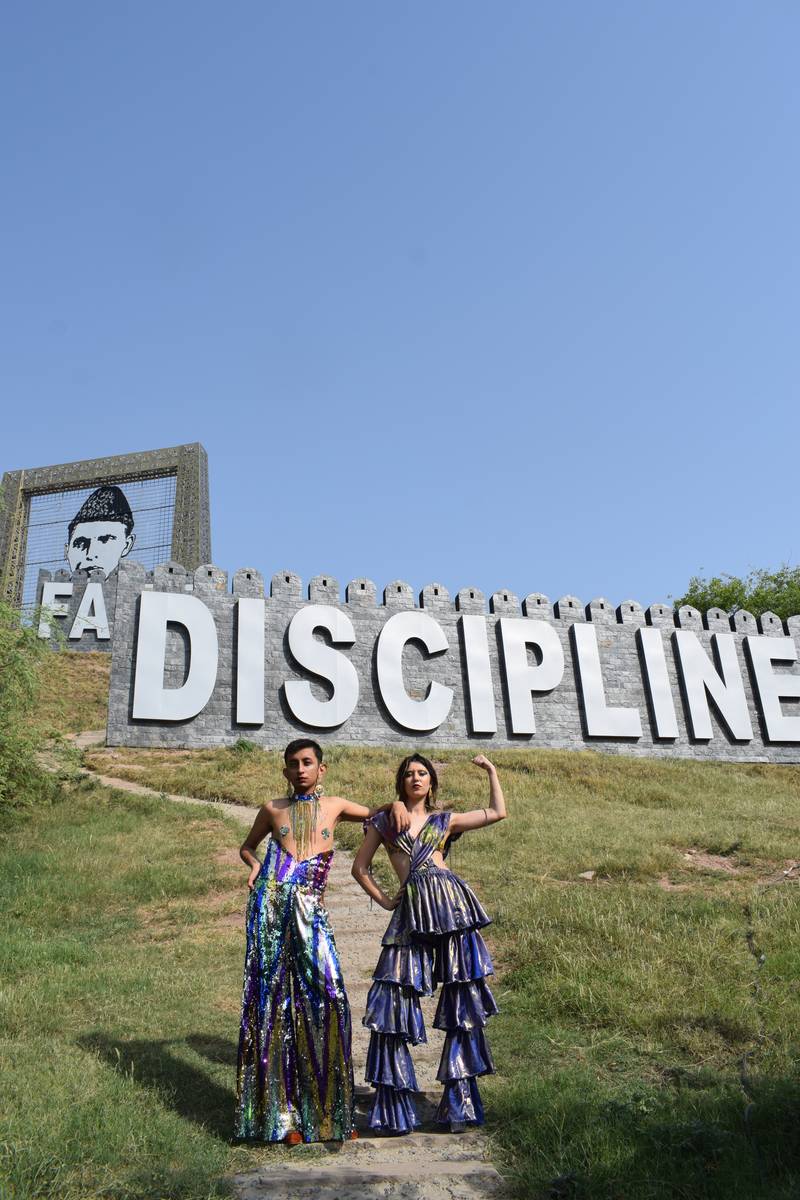

Promotional shoot for ‘Mystical Shayari’s’ Disco Rani music video, which remains unreleased and has only been screened in underground venues | Photo courtesy of ‘Mystical Shayari’
In August 2021, a local music duo, ‘Mystical Shayari’, one half of whom is a young trans person, became the victim of transphobia under the guise of religious honor, weaponized using the internet. A flamboyant, queer-coded photoshoot by the band in front of the portrait of the country’s founder, Muhammad Ali Jinnah, near Express Highway, Islamabad, went viral on Twitter after it was tweeted as outrage clickbait by bot farm maestro Farhan Virk’s wife - incidentally a full two weeks after it was first published. On social media, the images invited outrage, copious hand-wringing over society’s moral decay, and death threats. The photos came to the attention of influential rightwing journalist Ansar Abbasi, who tagged the District Commissioner of Islamabad and asked for the couple to be arrested for spreading “obscenity”.
Musician Zulfiqar Mannan, who found themselves at the center of the controversy, ended up losing their job and fighting a long legal battle. Looking back, do they wish they had done things differently? Zulfi asserts otherwise: “It’s a cynical viewpoint that we should be quiet and invisible.” They attribute this anti-trans backlash in Pakistan to strides the community has made in the last few years in terms of recognition, visibility, and financial empowerment. Before the Transgender Rights Act of 2018, the community had very limited means of earning a livelihood, such as sex work and begging. Zulfi says the backlash has come from the change in status quo, where trans people in Pakistan are not just an object of pity and ridicule anymore. “In society’s eyes, culturally privileged people who are visibly trans have committed a crime because we wanted more.” According to a local research-based advocacy organization for digital rights, based on the data, the campaign against Mystical Shayari was a deliberate, targeted, and funded campaign on social media.
Trans rights activist Hina Baloch shares how visible trans activists face vitriol online from the religious right-wing: “Previously, we used to receive such threats from fake accounts and right-wing Sunnis, but now conservative Shias have allied themselves with Sunni maulvis for the sake of political capital, and most recent rape threats and murder threats have come from hardline Shias from their own IDs. They may be a marginalized community, but they have fully allied themselves; even supposedly progressive Pakistani clerics like [Javed] Ghamdi have released a statement against trans rights recently.” Being Shia herself, this is especially painful.
The khawajasiras in the Indian subcontinent are a deeply spiritual community and traditionally take ownership of many symbols and theologies of Shia Islam. Shehzadi Rai, a transgender politician from Karachi, reached out to Shia clerics, requesting their support. “She beseeched them to support our community, saying that in 1986, in Iran, the theological debate about transgender people was settled and recognised as a permissible lifestyle. In response, they said: Do you want the same to happen to you as the Mahsa Amini protestors in Iran? They threatened to cut off our fingers, gouge out our eyes, and burn us alive. We even receive threatening messages on WhatsApp now. They no longer use fake profiles; they are so brazen and don’t even fear the FIA [Federal Investigative Authority that has a vigilant cybercrime wing].”
In the lead-up to the Sindh Moorat March – the first demonstration of its kind in Pakistan for which hundreds of trans people from across the country gathered together to campaign for equal rights and highlight injustices faced by the community – Baloch describes the kinds of threats its leadership faced. “While I was out one day, my mother called me and said you and Shehzadi should stay elsewhere tonight. Two dozen maulvis had arrived at my house, and they said we want to talk to your son and grilled my mother about how she was allowing me to do these haram things. They told her to send me to them, and promised they would fix me. I couldn’t come home for the next three days for fear of my safety.” Later, Baloch had to leave the city because of online and in-person death threats, not just to her but also to her family. “I received a hand-delivered letter in the letterbox outside the house, and it said if we can’t find you, we will kill your brother. We contacted the police, and they basically said they wouldn’t be able to give us adequate protection and advised us to leave the city for two weeks instead - essentially to wait out the threat.”
Stories of transgender people have always been told in Pakistani art, though not without their problems around representation. Late last year, however, the Pakistani film ‘Joyland’ by Saim Sadiq, which features transgender actress Alina Khan as one of the leads, got swept up in this anti-trans backlash surging through the country. The vitriol followed a familiar script: hashtags, outrage, and threats of violence online, which led to religious organizations protesting against the film on the streets. The film was lauded at prestigious film festivals abroad, including Cannes - a first for Pakistan - but right before its theatrical release, it was banned in the country. Ultimately, due to pressure from progressive voices on social media, a censored version of the film was allowed to run in some parts of the country, but the film remained banned in Punjab, not only the most populous province but also where the film is set and shot; much of the film dialogue also happens to be in the Punjabi language.


L to R: Haider (Ali Junejo) and Biba (Alina Khan) in ‘Joyland’ | Photo courtesy of ‘Joyland’
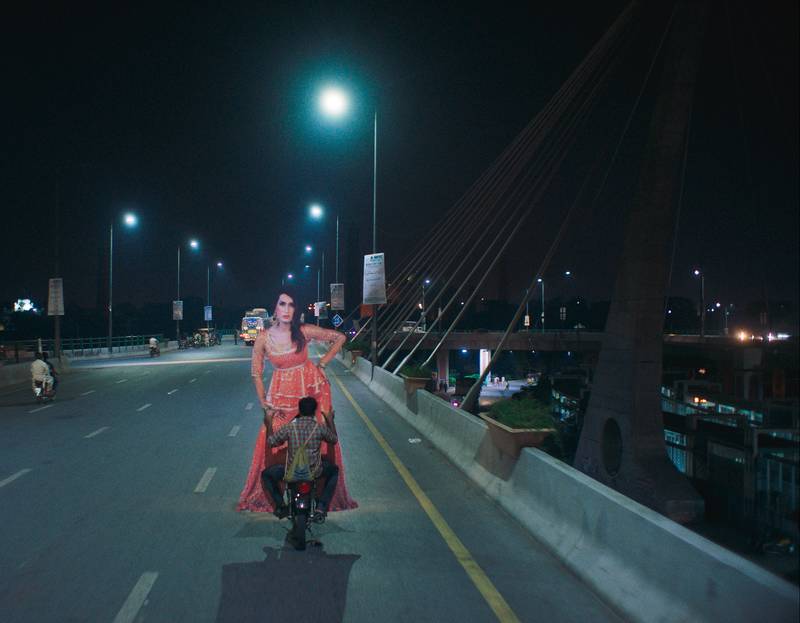

An iconic scene from ‘Joyland’, where Haider (played by Ali Junejo) is seen holding Biba’s (played by Alina Khan’s) cut-out poster | Photo courtesy of ‘Joyland’
“They can’t accept a trans actor actually playing the role of a trans person in the film. They want to keep us in our place, as people to be pitied.” Alina says she stayed off the internet for weeks because of the barrage of violent hostility towards the film and specifically herself. In a way, it simply mirrored her life before the film; only the platforms had changed.
Alina, who earned her living by doing erotic dances for private gatherings before her career as an actress, says that it was nice to go abroad and be recognized. However, what she had been really excited about was the film playing in cinemas in Lahore, where she lives. “I wanted my siblings to watch it, my parents to watch it, people who had grown up with me, who I had studied with, people who had tried to exploit, abuse, and mock me. I felt it would make people in my life finally see me as a human being.” When she heard about the ban just three days before the film’s release, she called her mother and wept uncontrollably. “They can’t accept a trans actor actually playing the role of a trans person in the film. They want to keep us in our place, as people to be pitied.” Alina says she stayed off the internet for weeks because of the barrage of violent hostility towards the film and specifically herself. In a way, it simply mirrored her life before the film; only the platforms had changed. “We are a joke to people. People like Maria B, who spread hate against us, don’t know anything about our lives. They don’t see the poverty, helplessness, and lack of opportunity that are such a big part of our lives. Every human being deserves a dignified livelihood.”
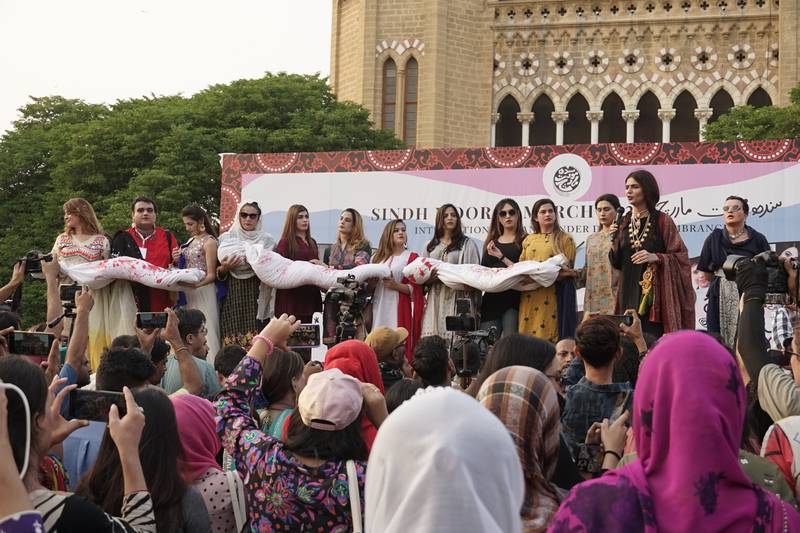

Organisers of the ‘Sindh Moorat March’ carried effigies of three transgender women who they say were murdered directly as a result of the recent rise in transphobia.
The Sindh Moorat March, which took place at the peak of this wave of transphobia in the country, was simultaneously a raucous celebration of the khawajasira identity as well as a public lament over the widespread cruelty faced by the community. During one of the most moving parts of the march, the organizers publicly mourned three khawajasira deaths in particular. Violence against the community is not new, but killings have historically been either crimes of passion or honor killings by family members. These three murders stand out because the perpetrators were strangers to the victims. After being caught by the police, they confessed their motivation was to remove the social ill that is the very existence of transgender people because it is against God’s natural order - a new phenomenon that community leaders have attributed directly to the increase in hateful discourse about transgender people in the last two years, a lot of which was fanned online.
Shortly after the Moorat march, Shehzadi was followed by a gang of men in the park where she goes for a walk every evening, who grilled her about whether she was intersex or trans. This is a distinction that has been heavily pushed by fashion designer Maria B on her massive online platform, with the argument that only intersex people are deserving of state protection and trans people are perverts. The men implied they would physically verify it themselves. Shehzadi could only escape because some trans women begging on the streets came to her rescue and chased the gang away. Shehzadi’s mother warned her not to come home because her brother had been meeting with people from Jamaat-e-Islami (JI). She was afraid for her daughter’s life and told her she was afraid her brother would kill her for “honor”, that JI would pay him to do it, and he would even go scot-free because Shehzadi’s father would forgive him under the diyat laws that allow a murder victim’s kin to forgive the murderer for a price.
While the state clamps down on progressive activists in online spaces through laws such as the repressive Cyber Crime Act, rightwing groups and individuals - including Sunni Tehreek, Jamaat-e-Ulema-e-Islam (F), and Tehreek-e-Labbaik Pakistan (TLP) - are given a wide berth. It is often argued that the Pakistani establishment’s symbiotic relationship with certain Islamist political actors is the cause. The Pakistani military has long been accused of using the street power of religious groups to control politicians at home and fight its proxy wars abroad. Many progressives also allege that the military establishment deliberately cultivates certain online personalities as assets they can employ to target dissenters or critics of the state. Several successive DG-ISPRs have bragged publicly about their ‘5th generation warfare’ strategy - a propaganda war of information and perception—and have invited bloggers, podcasters, and YouTubers to closed meetings at GHQ. A Sindh-based senior feminist activist argues that several of these ‘assets’ have become powerful and influential in their own right since they have monetised their sizable platforms and so no longer require the establishment’s patronage. Some of these are large, oft-suspended Twitter accounts such as @soldierspeaks, Hanzala, @rizwow, and @umarFKhawaja.
Academic and columnist Umair Javed also argues in the English language newspaper Dawn that the state has “no coherent ideological response” to curtail this kind of aggression by rightwing political actors such as the TLP, given that it has always used religious rhetoric to acquire legitimacy. He elaborates: “Years of using the same rhetoric, paying fealty to the same goals, and exploiting the same anti-minority fault lines will produce an outcome where a movement can stand up and assert itself as the true representative of this cause.”
It is not just the military establishment but also mainstream political parties deploying this rhetoric of religious honor to smear political opponents, particularly during election years. For example, a recent online smear campaign against former Prime Minister Imran Khan was launched by the PML-N after Khan hired a prominent UK lawyer who happened to have represented author Salman Rushdie decades ago. That tenuous connection to an alleged “blasphemer” is enough to malign, discredit, and possibly do much worse than that. Since all political actors are now wielding this cudgel, no one seems willing to step away from this inflammatory discourse, as that simply leaves a vacuum for others to fill.
These self-styled saviors of Islam and the supposedly holy gender binary often accuse transgender people and their allies of having a “Western agenda” and being paid by Western institutions to supposedly promote sexual perversion in society. However, it is interesting that many of their transphobic talking points are directly copied from right-wing transphobic movements in the US and Europe.
In colluding thus with the religious right-wing, the state is indeed playing with fire because it is an indiscriminate threat and can even impact otherwise powerful institutions and individuals within the state itself. Hina Baloch says: “It is not as if the state also does not suffer because of it. [Former Chief of Army Staff Qamar] Bajwa faced a smear campaign alleging he’s Ahmedi and had to invite [popular Islamic cleric Maulana] Tariq Jameel for his son’s nikah ceremony, and then also hosted Barelvi maulvis for a milaad once to his home [to protect his reputation]. Salmaan Taseer – an immensely wealthy Sunni man with a lifetime of accrued political power – was killed based on mere media buzz about alleged blasphemy, not even a formal charge. No FIRs need to be filed, and no case needs to be fought in court. Just the allegation of blasphemy is a death sentence.”
The state may have its reasons to not be a roadblock for these extremist voices weaponizing religion. Still, as independent researcher and writer Rabia Mehmood argues, there is no excuse for social media companies to not enforce their own codes of conduct. Writing for Al Jazeera, she points out the double standard in how incitement to violence is dealt with by companies such as Twitter and Facebook in the US, as opposed to the general indifference to similar threats in the global south. She asks: “Why are tweets and posts inciting violence against persecuted religious groups, human rights defenders, journalists, opposition members and progressives in Pakistan not being treated the same way by social media companies as Trump’s tweets instructing his supporters to ‘fight’ for him or QAnon content deemed ‘potentially harmful’?”
YouTube’s recent de-platforming of Raja Zia ul Haq of Youth Club is a welcome step in that direction. Haq had over 666,0000 subscribers on YouTube, where he had posted nearly a thousand videos; many of the recent ones were targeted towards the transgender community in Pakistan and their supposedly nefarious agenda. However, Haq is listed as the CEO of Youth Club, and its YouTube channel, with 1.25 million subscribers, remains operational.
As a direct result of the campaign of hate led by the likes of Raja Zia ul Haq, Senator Siraj-ul-Haq, fashion designer Maria B and others, the Federal Shariat Court (FSC) of Islamabad ruled earlier this year that the sections of the Transgender Act 2018 that relate to gender identity, the right to self-perceived gender identity, and the right of inheritance for transgender people do not conform with their interpretation of Islamic principles. With immediate effect, the Court ceased the sections deemed ‘un-Islamic’. Significantly, during the delivery of the verdict, the Court speculated that the Act could pave the way for rape and sexual assault of women, as they allege the Act makes it easy for a man to gain access to “exclusive spaces” intended for women, “disguised” as a transgender woman. There is no publicly available evidence of such incidents in Pakistan, but it has been a talking point pushed by the transphobic morality brigade online. These self-styled saviors of Islam and the supposedly holy gender binary often accuse transgender people and their allies of having a “Western agenda” and being paid by Western institutions to supposedly promote sexual perversion in society. However, it is interesting that many of their transphobic talking points are directly copied from right-wing transphobic movements in the US and Europe.
Just as Senator Siraj ul Haq gathered like-minded transphobes to his cause, the escalating transphobia has similarly brought out strong allies of the transgender community. The artist, Zulfikar Bhutto, who belongs to one of Pakistan’s most powerful political families, offered his historic family home as the site of the Sindh Moorat March’s first organizing meeting. During the march, he stood shoulder to shoulder with trans activists and won many hearts when someone began chanting “Jeay Bhutto” (Long live Bhutto) in the crowd. Zulfikar countered, “Jeay Bhutto choro, jeay awaam, sada jeay awaam, jeay khawajasira, jeay aurat [forget ‘long live Bhutto’, long live the people, long live the transgender community, and love live women].” The grandson of the former Prime Minister of Pakistan said that Sindh belongs to the people. “Sindh is yours. It does not belong to my family; it belongs to you,” he told the crowd. “You’re the heirs of Sindh; khawajasiras are the heirs of Sindh. I’m only the heir of my grandfather, but you are the true heirs of Sindh.”
The anger of the khawajasira community has been a galvanizing force, and activists are not ready to give up the fight. The FSC judgment is currently being appealed, so the battle to bring back the Transgender Protection Act is ongoing. NADRA, the government body responsible for issuing National Identity Cards (NICs) through which citizens access state services and institutions, had suspended the registration of NICs for transgender citizens following the FSC judgment. However, the activism of Nayab Ali, a trans rights activist, as well as allies such as the National Commission for Human Rights (NCHR), lawyer Reema Omer, and ex-senator Farhatullah Babar, has resulted in the reversal of that decision by NADRA, ending a three-month suspension of services to transgender citizens. Such wins feel like a welcome relief in an environment that has become increasingly hostile to the community.
Meanwhile, civil society groups, such as the Digital Rights Foundation, Media Matters, and Soch Fact Check, continue to pressure tech giants to take responsibility for hate speech based on local context that promotes violence and social exclusion on their platforms in countries such as Pakistan. Success on this frontier will go far in blunting the weapon that the internet has become in the hands of transphobes and will impair these hate campaigns significantly. The lives of many in Pakistan are on the line.
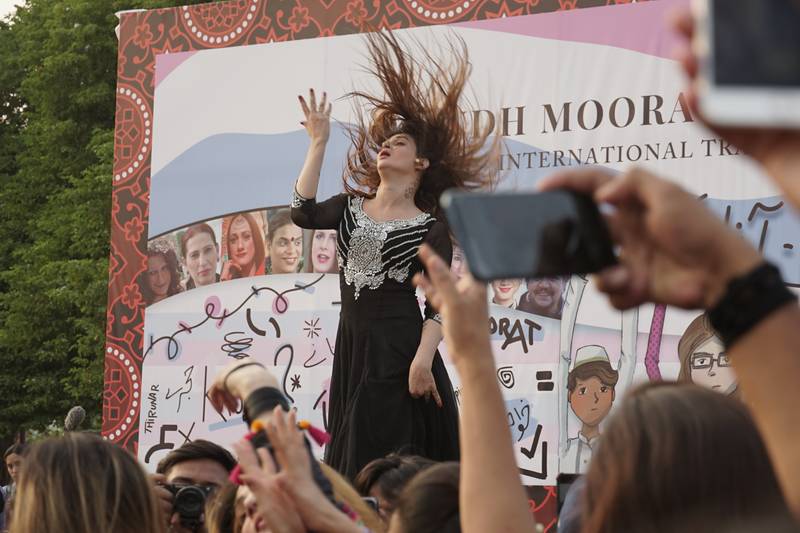

A dance performance by Madam Dollar at the ‘Sindh Moorat March’ 2022.
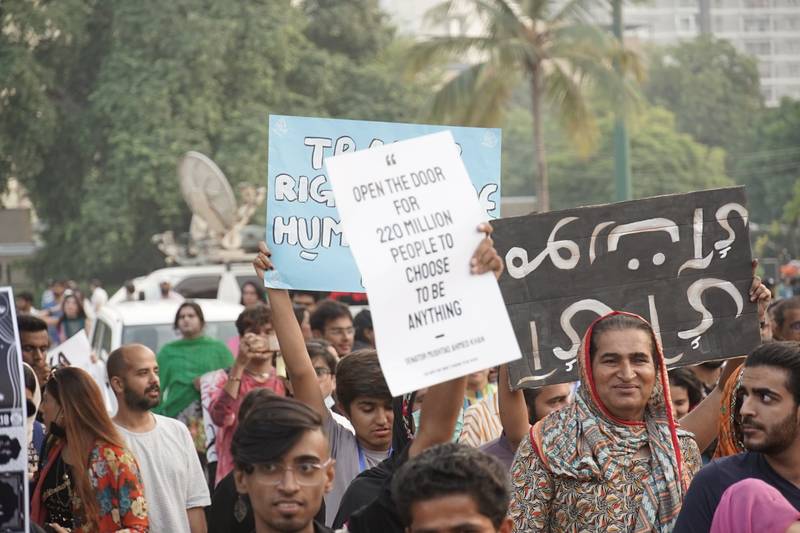

Members of the trans community and allies gathered outside Frere Hall, Karachi, for the ‘Sindh Moorat March’.
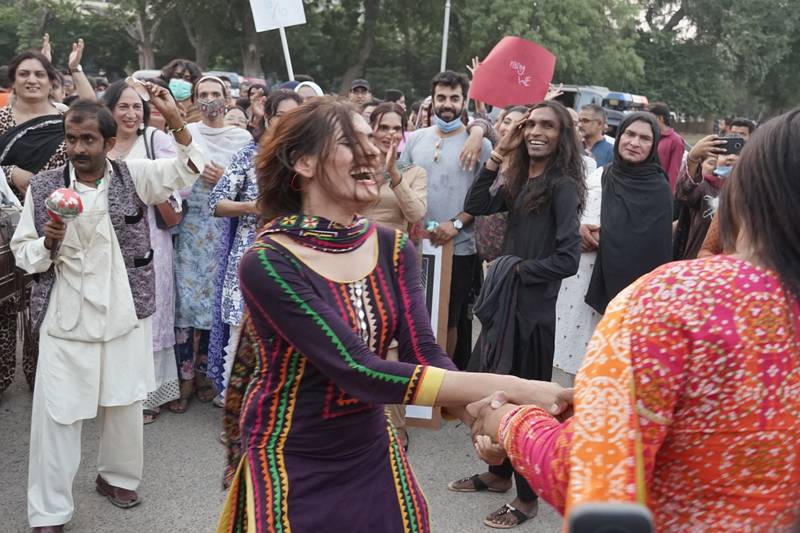

Mourning and joy existed side by side at the Sindh Moorat March.
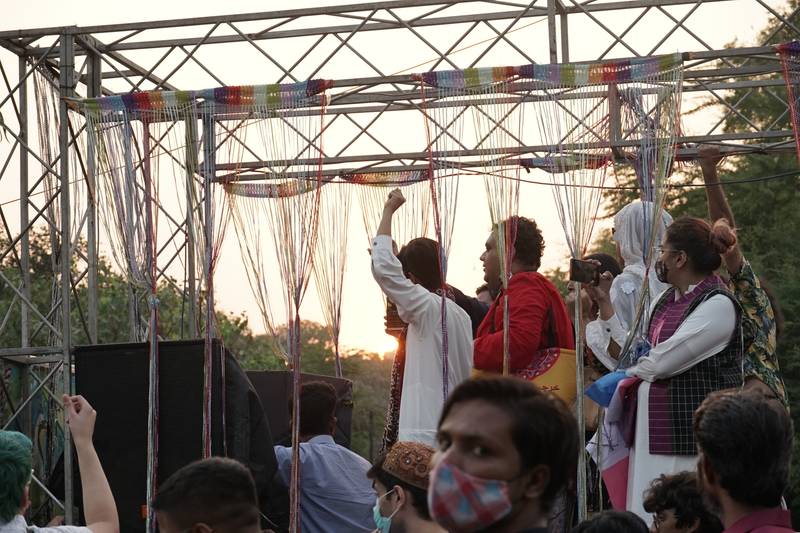

Organisers gave impassioned speeches about the status of trans people in the country.


